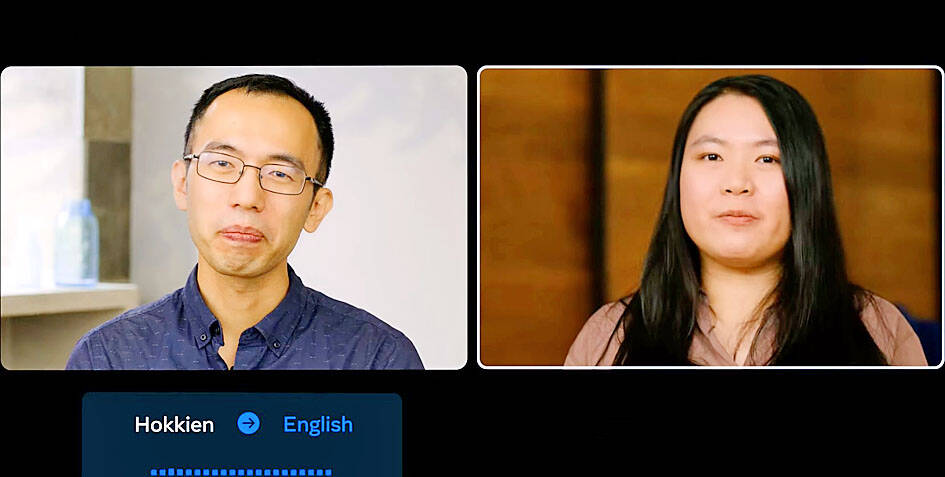Meta Platforms on Wednesday said it has built an artificial intelligence (AI) system that translates Hoklo into English even though the Taiwanese language lacks a standard written form.
The Silicon Valley tech titan that owns Facebook and Instagram billed the work at its Universal Speech Translator project as an effort to enable users from around the world to socialize regardless of the languages they speak.
When Facebook renamed itself Meta a year ago, cofounder and CEO Mark Zuckerberg said the company was focusing on a shift to online life playing out in virtual realms, a concept referred to as the metaverse.

Photo: Screen grab from Mark Zuckerberg’s Facebook page
“Spoken communications can help break down barriers and bring people together wherever they are located — even in the metaverse,” Meta said in a blog post.
The fledgling system for translating Hoklo (commonly known as Taiwanese) was billed by Meta as the first artificial intelligence-powered “speech-to-speech translation system developed for an unwritten language.”
The translation technology, which the tech firm said would be shared for others to use, allows someone speaking Hoklo to converse with someone who speaks English, but only with one full sentence at a time, Meta said.

Photo: screen grab from Meta Platforms’ YouTube channel
“It’s a step toward a future where simultaneous translation between languages is possible,” Meta said.
“The techniques we pioneered with Hokkien [Hoklo] can be extended to many other unwritten languages and eventually will work in real time,” it said.
Hoklo is widely spoken within the Chinese diaspora. It is used by 16 million people across Asia and is spoken by three-quarters of the population of Taiwan, according to the French National Institute of Oriental Languages and Civilizations.
However, the language lacks a standard written form, making it a challenge to train AI models how to interpret what is said, Meta said.
More than 40 percent of the world’s 7,000 existing languages are primarily spoken, without a standard or widely known written form, the tech firm said.
“In the future, all languages, whether written or unwritten, may no longer be an obstacle to mutual understanding,” Meta said.
TAIWANESE ENGINEER
Chen Peng-jen (陳鵬仁), the engineer who codeveloped the system, said he was motivated by a desire to improve communication with his 70-year-old father, Chen Sheng-chiang (陳聖獎).
Chen Peng-jen grew up speaking Mandarin, but his father, who grew up in Tainan where Hoklo is the dominant language, does not speak as fluently in Mandarin, he said.
“I’ve always hoped that my dad could speak with everyone in Hoklo, because that’s what he’s more comfortable speaking,” he said.
Chen Peng-jen said that he and the research team at Meta used Mandarin as an intermediate language between Hoklo and English, and worked closely with native Hoklo speakers to ensure the accuracy of the system’s translation.
Meta engineer Joshua Yang (楊約書亞) said the team employed 30,000 hours of TV dramas and translated documents in the process of developing the system.
Hou Tsung-yu (侯宗佑) — who identified himself as a friend of Chen Peng-jen since high school — said on Facebook that Chen Peng-jen has long been diligent in his efforts to preserve Hoklo, even while living and working in the US.
“He looks for Hoklo teaching materials wherever he can find them, so that children of Hoklo speakers can learn and practice the language of their parents,” Hou wrote.
Additional reporting by staff writer with CNA

AGING: As of last month, people aged 65 or older accounted for 20.06 percent of the total population and the number of couples who got married fell by 18,685 from 2024 Taiwan has surpassed South Korea as the country least willing to have children, with an annual crude birthrate of 4.62 per 1,000 people, Ministry of the Interior data showed yesterday. The nation was previously ranked the second-lowest country in terms of total fertility rate, or the average number of children a woman has in her lifetime. However, South Korea’s fertility rate began to recover from 2023, with total fertility rate rising from 0.72 and estimated to reach 0.82 to 0.85 by last year, and the crude birthrate projected at 6.7 per 1,000 people. Japan’s crude birthrate was projected to fall below six,

Conflict with Taiwan could leave China with “massive economic disruption, catastrophic military losses, significant social unrest, and devastating sanctions,” a US think tank said in a report released on Monday. The German Marshall Fund released a report titled If China Attacks Taiwan: The Consequences for China of “Minor Conflict” and “Major War” Scenarios. The report details the “massive” economic, military, social and international costs to China in the event of a minor conflict or major war with Taiwan, estimating that the Chinese People’s Liberation Army (PLA) could sustain losses of more than half of its active-duty ground forces, including 100,000 troops. Understanding Chinese

US President Donald Trump in an interview with the New York Times published on Thursday said that “it’s up to” Chinese President Xi Jinping (習近平) what China does on Taiwan, but that he would be “very unhappy” with a change in the “status quo.” “He [Xi] considers it to be a part of China, and that’s up to him what he’s going to be doing, but I’ve expressed to him that I would be very unhappy if he did that, and I don’t think he’ll do that. I hope he doesn’t do that,” Trump said. Trump made the comments in the context

SELF-DEFENSE: Tokyo has accelerated its spending goal and its defense minister said the nation needs to discuss whether it should develop nuclear-powered submarines China is ramping up objections to what it sees as Japan’s desire to acquire nuclear weapons, despite Tokyo’s longstanding renunciation of such arms, deepening another fissure in the two neighbors’ increasingly tense ties. In what appears to be a concerted effort, China’s foreign and defense ministries issued statements on Thursday condemning alleged remilitarism efforts by Tokyo. The remarks came as two of the country’s top think tanks jointly issued a 29-page report framing actions by “right-wing forces” in Japan as posing a “serious threat” to world peace. While that report did not define “right-wing forces,” the Chinese Ministry of Foreign Affairs was